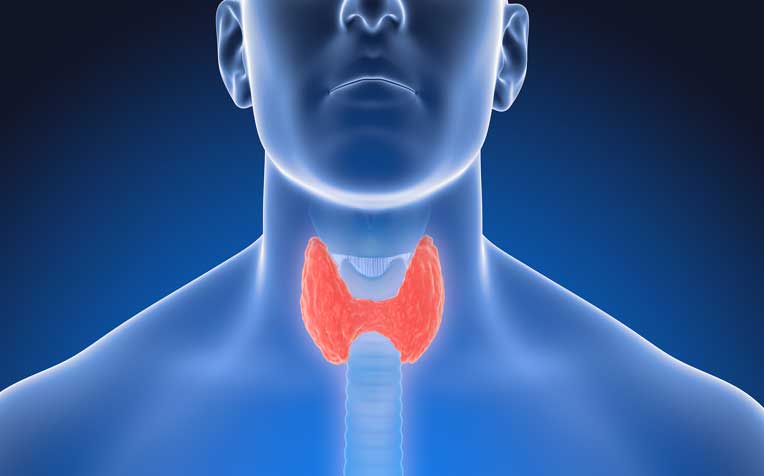Thyroid is a butterfly shaped small gland found at the base of your neck, just below your Adam’s apple (Windpipe “Trachea”). This produces hormones which will affect your body temperature, heart rate and metabolism in many ways. Irregularity in these hormones can cause potentially serious health problems that may need treatment. In this, I am going to write briefly about what is thyroid and what are thyroid symptoms.
Thyroid conditions do not discriminate – they can impact anyone, irrespective of gender, age, or life stage. This includes men and women, infants, teens, and senior citizens. Some individuals may have it from the moment they’re born, often manifesting as hypothyroidism, while in others, it may develop later in life, frequently post-menopause for women.
The prevalence of thyroid disease is high. It’s estimated that about 20 million individuals across the United States grapple with some form of thyroid disorder. When it comes to gender, the scales are tipped in favour of women who are about five to eight times more likely to receive a thyroid condition diagnosis compared to men.
Certain factors can potentially escalate your risk of succumbing to a thyroid condition.
- A family history teeming with instances of thyroid disease.
- An existing medical condition. Some conditions that might make you more susceptible include pernicious anaemia, Type 1 diabetes, primary adrenal insufficiency, lupus, rheumatoid arthritis, Sjögren’s syndrome, and Turner syndrome.
- Taking medication high in iodine content, such as amiodarone.
- Being over the age of 60, the risk is notably higher for women.
- Past treatment for a thyroid issue or thyroid cancer, including a thyroidectomy or radiation therapy.
Thyroid Symptoms
Thyroid disease can exhibit a multitude of symptoms. The unfortunate aspect is that these indicators often overlap with signs of other medical conditions or various life stages, which can complicate the diagnosis.
Primarily, thyroid disease symptoms can be grouped into two categories — those resulting from an excess of thyroid hormone (hyperthyroidism) and those associated with a deficit of thyroid hormone (hypothyroidism).

Indications of an overactive thyroid, or hyperthyroidism, can encompass:
- Feelings of anxiety, restlessness, irritability and nervousness.
- Mood swings
- Having trouble sleeping
- Sudden weight loss.
- The presence of an enlarged thyroid gland, also known as a goiter.
- Experiencing muscle weakness and tremors.
- Irregular menstrual cycles or cessation of menstruation.
- Increased sensitivity to heat.
- Vision issues or irritation in the eyes.
- In contrast, symptoms of an underactive thyroid, or hypothyroidism, may involve:
- Persisting fatigue.
- Weight gain.
- Issues with memory and forgetfulness.
- Heavy and frequent menstrual periods.
- Dryness and coarseness of hair.
- A hoarse voice.
- Intolerance to cold temperatures.
- Trembling or twitching
Lifestyle
- Maintain a Healthy Body Weight.
- Manage Stress With Yoga Classes or Meditation
- Practice Restorative Sleep Habits Every Night
- Learn to Listen to Signals From Your Body
- Less Sugar = Less worries
- Strength and Muscles go a long way
- Gluten – free diet
Foods to Eat
- Vegetables
- Canola and olive oils
- Ginger and turmeric
- Lots of Nuts
- Whole grains
Foods to Avoid
- Goitrogens
- Millet
- Highly processed foods
- Soy-based foods
- peaches, pears, and strawberries
- Beverages
- cruciferous vegetables
Supplements
Here are some key nutrients vital for maintaining thyroid health:
Selenium. This mineral plays a crucial role in the production of thyroid hormones and shields the thyroid from damage by oxidative stress. Given that the thyroid contains substantial amounts of selenium, a deficiency can lead to thyroid dysfunction.
Iodine. Essential for thyroid function, iodine’s primary role is supporting thyroid hormone production. Two important thyroid hormones, Triiodothyronine (T3) and Thyroxine (T4), contain iodine. A lack of iodine can trigger thyroid disease.
Zinc. This mineral is necessary for the production of thyroid hormones. A balanced concentration of zinc is imperative for maintaining healthy levels of T3, T4, and Thyroid-Stimulating Hormone (TSH).
Iron. The thyroid utilises iron to convert T4 into T3, the active form of the thyroid hormone. An iron deficiency can be linked to thyroid dysfunction.
FAQ
What symptoms can thyroid problems cause?
Thyroid problems can lead to various symptoms depending on whether the thyroid is overactive or underactive. Anxiety, difficulty sleeping, weight loss, muscular weakness, and sensitivity to heat are just a few of the symptoms of hyperthyroidism or an overactive thyroid. Conversely, underactive thyroid, or hypothyroidism, can cause fatigue, weight gain, forgetfulness, and intolerance to cold temperatures.
Is thyroid a serious problem?
While thyroid problems are generally manageable with proper medical care, they can be serious if left untreated. Symptoms can interfere with daily life, and certain complications can be life-threatening. It’s important to seek medical attention if you suspect a thyroid problem.
What is the cause of thyroid?
Iodine deficiency, autoimmune disorders, certain drugs, and hereditary abnormalities are just a few of the things that might have an effect on the thyroid. A thyroid problem might also be more likely to develop if you have a family history of it, have specific medical illnesses, or have had thyroid therapy in the past.
What does thyroid do to a person?
The thyroid plays a vital role in regulating the body’s metabolism, body temperature, muscle strength, and even mood. A dysfunctional thyroid can cause various symptoms and impact a person’s overall wellbeing.
How to control thyroid in females?
Managing a thyroid condition involves regular medical check-ups, taking prescribed medications, maintaining a balanced diet rich in thyroid-supporting nutrients like iodine, selenium, zinc, and iron, and regular exercise. It’s also crucial to monitor symptoms and communicate any changes to your healthcare provider.
What is the treatment of thyroid?
Treatment of thyroid conditions depends on the type and severity of the disorder. It may involve medication to either decrease or increase hormone production, dietary changes, or in severe cases, surgery. Regular monitoring is essential to assess the effectiveness of the treatment plan.
How can I reduce my thyroid problem?
Reducing the impact of a thyroid problem involves a combination of medical treatment and lifestyle modifications. Regularly taking prescribed medication, adhering to a balanced diet, maintaining a healthy weight, managing stress, and regular check-ups can help manage the condition. Always consult your healthcare provider for personalised advice.

